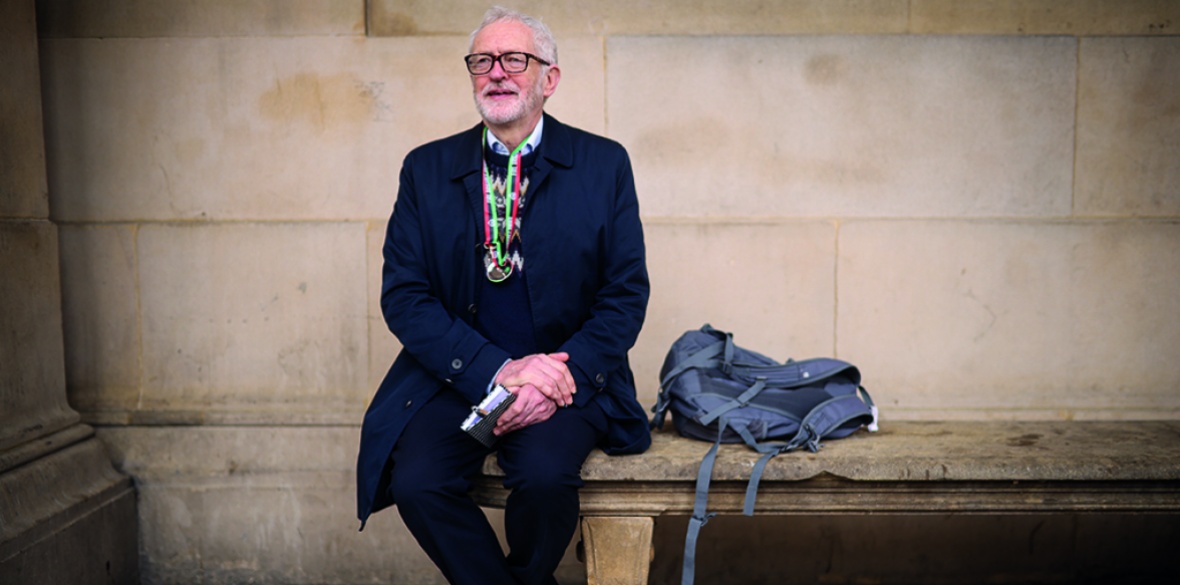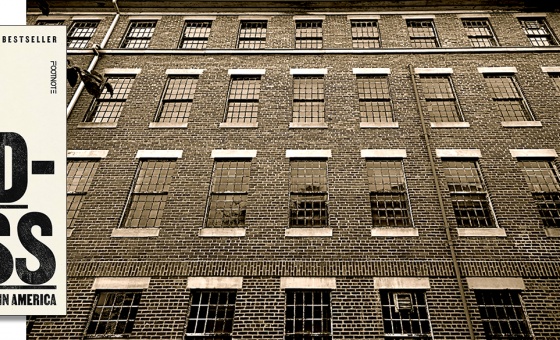This is the last article you can read this month
You can read more article this month
You can read more articles this month
Sorry your limit is up for this month
Reset on:
Please help support the Morning Star by subscribing here
JEREMY CORBYN has served in the “mother of parliaments” for 40 years. Who better to answer the question: is Britain a representative democracy?
“No, it’s not. Our parliamentary system is ineffective at controlling the executive.
“We need fundamental democratic change — abolishing the House of Lords, bringing all decisions under the royal prerogative under parliamentary scrutiny.”
Parliament itself has “never been hugely representative of working-class communities,” and while the Labour Party originally set out to change that (“the 1910 PLP had one person who wasn’t a manual worker, Sidney Webb”) the selection process nowadays “requires a lot of connections and actually a lot of money.”
Corbyn applauds initiatives like that by Unite from 2015 to push more union reps to become Labour representatives, but the small steps forward that meant in bringing more diverse candidates into Parliament in 2017 and 2019 are already being rolled back, with the Keir Starmer leadership notorious for fixing selections to engender a crop of vetted, identikit lobby-fodder MPs.
Cynon Valley MP Beth Winter and North of Tyne Mayor Jamie Driscoll are the latest high-profile victims of Starmer’s quest for a uniformly neoliberal political scene.
The purges have drawn comparison with the 1980s, but Neil Kinnock’s attacks on the left faced more resistance than Keir Starmer’s today, and were less extreme.
Much of the manoeuvring around candidate selection sounds familiar: in 1983 Tony Benn’s Bristol South East constituency was abolished in boundary changes and a different candidate was chosen to fight the new Bristol South seat.
Islington North’s MP, Michael O’Halloran, had defected to the Social Democratic Party in 1981, but the SDP selected another MP as its candidate, leading him to stand as “independent Labour” for the seat Corbyn, as the official Labour candidate, would win.
Even so, the atmosphere was nothing like today.
Benn, who had lost out in the selection process in 1983, was then elected for Chesterfield in a by-election. “The leadership didn’t particularly want Tony to be the candidate but they didn’t interfere.”
And Denis Healey — the rightwinger who beat Benn to the deputy leadership in 1981 — actually campaigned for Benn. “He said politics wouldn’t be the same without Tony and Denis, it was like [ice skaters] Torvill and Dean. So it was an absolutely different atmosphere to today.”
There was less of an enforced consensus on international policy too, with the Falklands war provoking serious debate across the left despite what Corbyn admits was a generally pro-war feeling in the country.
“Benn spoke very strongly against it. Michael Foot supported the war, which was a surprise to a lot of people.”
Does he think that today’s MPs are so reckless on questions of war and peace — seemingly casual about the risk of escalating conflict with a nuclear adversary — because the generation that experienced total war during the second world war are no longer in Parliament?
“Absolutely. Those that have been in wars are usually much more reluctant to start another one.”
It is war that comes to mind when I ask for his worst memories from 40 years in the Commons. Voting against the Gulf war in 1991 was “a very lonely place to be.” But the much bigger revolt against the 2003 invasion of Iraq didn’t cheer him. “Iraq was, in many ways, the worst because I don’t believe anyone that had objectively looked at any of the information at the time honestly believed that Iraq had weapons of mass destruction.
“You wouldn’t have to read very far into those documents to see that it was nonsense. Huge pressure was put on Labour MPs to vote for this — and that they did so was one of the low points.”
Others occurred during the miners’ strike, which erupted within a year of his election. He recalls disrupting Parliament with Eric Heffer and others, taking down the mace in a bid to stop a session where Thatcher was pushing through cuts to welfare benefits for miners’ families. “You had this desperation in the coalfield communities — and the government was trying to starve them back to work, literally.”
During the strike Corbyn was at “hundreds of picket lines, rallies, and so on… the Morning Star was central to the organisation of miners’ support groups. Labour Party members by and large were very supportive.”
But the demonisation of the miners was unprecedented, and he knew not to trust the media to give them a fair hearing. “We had a huge rally in Islington Town Hall, which I chaired very firmly, saying ‘Arthur Scargill has to speak at nine o’clock. I don’t care who else is speaking’ … I knew it was the only way we could get him on the Nine O’Clock News live, without any editing.”
That media demonisation too has its parallels today, in the concerted character assassination he himself experienced while leading Labour for five years.
But Corbyn has often been vindicated on a stand he was previously vilified for: as with the campaign for justice for the Guildford Four or Birmingham Six, or the anti-apartheid struggle. “We got loads of abuse from the papers. And it wasn’t till near the end that people came round. Sometimes it’s not easy, but you’ve got to stand up.”
I remember the 2016 vote of no confidence in Corbyn’s leadership, and how impressed many of us were by how unruffled he seemed by being denounced from all sides.
“Yes, I was quite used to being in a small minority. What the Parliamentary Labour Party as a whole couldn’t get in 2016 was that the system had changed — I was elected by the members. My mandate did not come from the parliamentary party.
“The whole process of the last three years has been to re-empower the PLP at the expense of the membership.”
He’s appalled by the Labour leadership’s current indifference to the “destruction of the NHS before our very eyes,” with its refusal to commit to ending privatisation.
“Dominic Cummings said the only time they got worried in the 2019 election was when I brought up the issue of American healthcare taking over the NHS.
“The media were obviously aware [of how resonant the issue was] as well, so they denounced the documents as a Russian plot.”
He’s obviously “extremely disappointed” in the current Labour leadership for returning to status quo politics, but doesn’t feel the movement he led was in vain.
“I think we managed to achieve a fundamental change in political outlook and attitudes,” he says, pointing to mass support for public ownership of rail, mail, energy and water, despite Westminster’s determination to ignore this. “And we exposed the hypocrisy and double standards of the majority of the British media.”
The effort to put people back in their box and shore up the system is now coming up against real anger among striking workers, public service users and communities enraged by the abuse of our environment by water and fossil fuel giants.
When Corbyn first became an MP, Thatcher had been PM for four years. “It was radically different from previous Tory governments. It pushed the idea of a marketised, individualised society rather than the more collective approach Britain had adopted since the second world war.”
For many on the left, that free-market orthodoxy crashed and burned in 2008 — and Corbynism was a political reflection of a wide recognition that change had to come.
The Establishment’s revenge now seems to entail ridding the Labour Party of left and trade union influences entirely, with Starmer frank that he “doesn’t care” about being seen as another Conservative Party.
That can only be a bad thing: “When I was very new in Parliament I and Harry Cohen, the Leyton MP, were in the tea room with Sheffield MP Joan Maynard. And she said to us as new MPs, ‘I’ll just give you one piece of advice: if both front benches are agreed on something, the working class is losing out.”
Membership purges: the ’80s
Before election to Parliament Corbyn had served as agent of Hornsey Labour Party, in which role the constituency had attracted national controversy when Tariq Ali, an International Marxist Group veteran, applied to join.
“We were under attack because he was admitted by the constituency party and rejected by the national executive committee… huge battle.
“Eventually [in October 1983, as Neil Kinnock was getting his purge of the left under way] there was one of these magic moments of bureaucratic nonsense when the Labour conference formally voted, one, admit Tariq Ali into membership; two, expel Tariq Ali. So there was about one minute when he was actually a member of the party.”
Miners’ welfare
Because of the sequestration of National Union of Mineworkers funds, the whole strike had to be run on a cash basis, “otherwise the government’s legal officers could have got hold of the money. I remember taking a very large sum of money in a carrier bag to St Pancras station, meeting [then NUM general secretary] Peter Heathfield in the gents’ toilet, leaving the money inside one of the cubicles and he went in and picked it up…”
Opposition to Kinnock
Leading Labour figure Eric Heffer walked off the stage when Neil Kinnock launched his famous 1985 denunciation of Liverpool City Council — but this dramatic moment had an element of comedy, Corbyn recalls: “Eric had walked off stage and was striding down the centre of the hall for the exit, everyone watching. And one of his friends who clearly hadn’t been listening to the speech saw him storming down the aisle, rushed over and said: ‘Eric, I sent you that letter about the meeting next week in Newcastle — can you come?’ Eric said ‘Not now, comrade, I’m staging a walkout…’”
Pinochet ping-pong
Corbyn congratulated Tony Blair on the Met’s arrest of General Pinochet in London in 1998, but later realised then home secretary Jack Straw was minded to let him go.
“Straw bought into the argument that Pinochet was an elderly man without his faculties and had to be allowed to go back to Chile on medical and humanitarian grounds.
“I’d seen the medical report on Pinochet from the hospital. The morning the statement was due to be made in Parliament I bumped into Straw coming out of the gym.
“I said ‘I hope it’s not true you’re going to do something today I profoundly disagree with.’ And he said, ‘Look, you’re a decent human being… you wouldn’t want someone who’s very ill to not to be allowed to go home.’
“I said, ‘This man isn’t ill and he needs to go on trial for mass murder.’ But Straw signed the order for Pinochet to go home. He was taken onto a Chilean air force plane on a stretcher, medics and doctors all around. Somewhere on the flight he changed into a general’s uniform and strode off the plane in Santiago surrounded by cheering admirers. I call it the Lazarus flight.”
Fair-weather friends?
Corbyn’s successor has flip-flopped on their relationship, describing him as a “colleague and a friend” when running for leader but since denying they were ever pals.
“I was very surprised [when Starmer said they were friends]. Obviously I know him, we were colleagues… but friends hang out together, do stuff together, we were not friends. Anyway he’s since denied this to be the case, whereas my position has been utterly consistent.”
The Morning Star
Besides writing a weekly column for the paper from 2005-15, Corbyn’s been a reader all his life; his parents read our forerunner the Daily Worker.
“My mum was a seller of the Daily Worker. When she was a student in the ’30s, one of the very few women students at King’s College, she sold the paper and one time she got on a tram. The driver saw her carrying the Daily Workers and refused the fee — ‘no, be my guest.’”

 Ben Chacko
Ben Chacko






